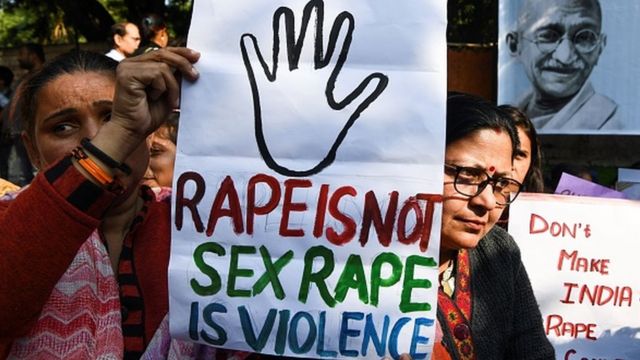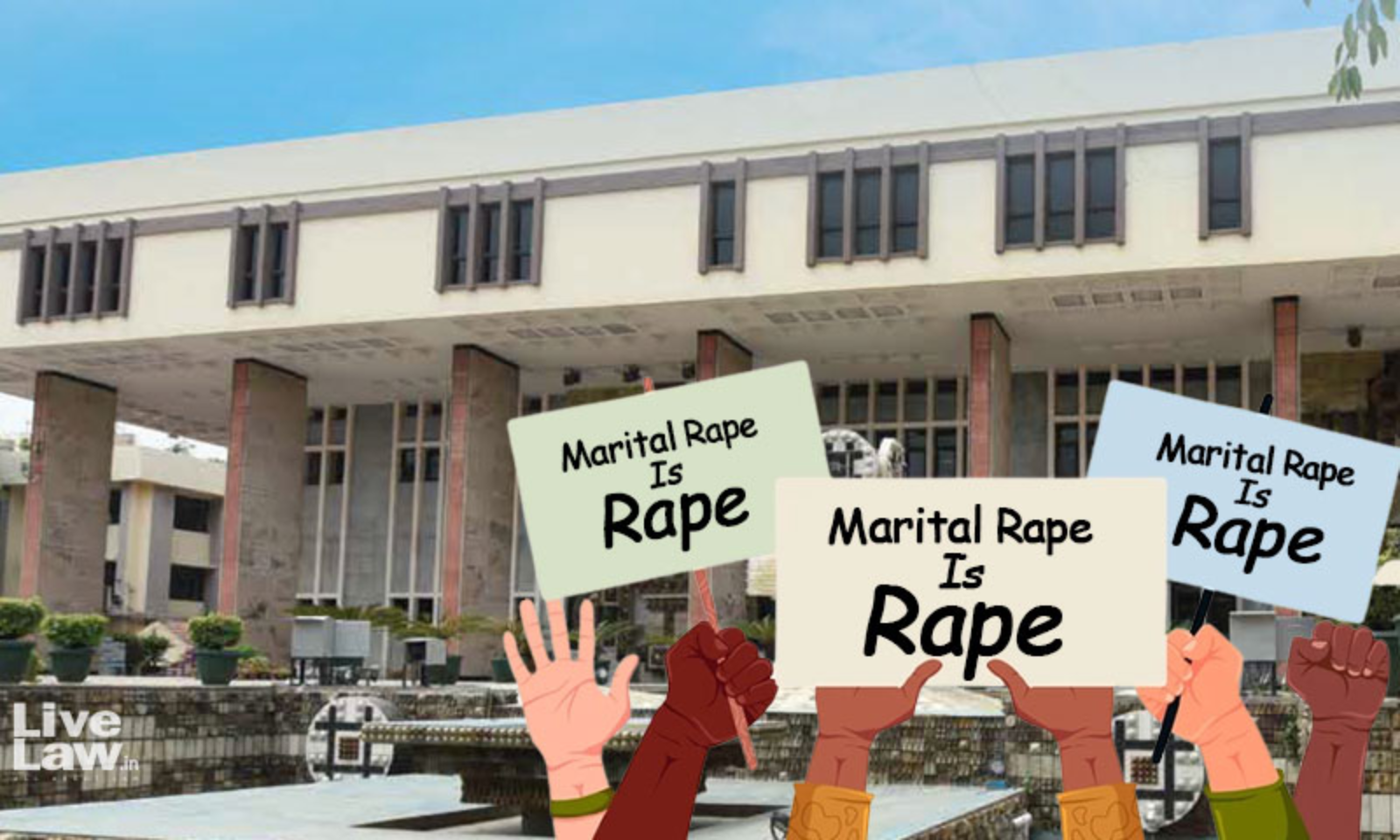Trigger warning: Mention of marital rape, sexual assault and violence
In India, the debate around martial rape began for the first time in 1971, with the 42nd Law Commission report. Before we explore how we can walk the tightrope of resisting the patriarchal logic of sanctioning rape within marriage and assess the split verdict of the Delhi High Court, we must investigate the difference between survivors/victims of marital rape and non-marital rape.
It is the difference between living with the dreadful memory of being raped, and actually living with the rapist. Yet, the law of our land does not constitute marital rape as a crime. In RIT Foundation v. Union of India, the Delhi High Court had to decide whether a husband is held criminally liable for raping his wife who is not under 18 years of age. Essentially, three provisions have been challenged in this case: The exception 2 to Section 375 of the Indian Penal Code (IPC), ubiquitously referred as marital rape exception, Section 376B which concerns sexual intercourse by a separated husband with his wife, albeit, without her consent, and Section 198B of the Code of Criminal Procedure, 1973 [hereafter referred to as the ‘Code’] which prohibits a court from taking cognisance of an offence punishable under Section 376B.
Two of these petitions are purely in the nature of public interest, while the third petition seeks to establish that petitioner has been subjected to sexual abuse including rape by her husband. She contends that because Marital Rape Exception (MRE) continues to remain in the statute, she is barred from prosecuting her husband.

Marital rape: Walking down the history lane
At this juncture, if we look at the history of MRE, a plain reading suggests that it is steeped in patriarchy and misogyny. Over 200 years ago, in 1736 to be precise, Sir Matthew Hale, Lord Chief Justice of the Court of King’s Bench expounded a doctrine in a document titled “History of the Pleas of the Crown” which stated that
The common law excluded the wife’s consent from the sphere of sexual acts. According to Hale’s Doctrine, a woman having entered matrimony was deemed to have given irrevocable consent to participation in sexual acts with her husband. The issue of marital rape was discussed for the first time in the 42nd Law Commission Report(1971). It highlighted the presumption of consent when the husband and wife are living together, and the differentiation between marital rape and “other” rape. However, it did not comment on whether the clause on marital rape should be retained or deleted.
Subsequently, in the 172nd Law Commission Report (2000) it was argued that there was no reason to shield rape from the ambit of law when other instances of spousal violence were criminalised. However, this argument was rejected outright by the Commission fearing that the criminalisation of marital rape would lead to “excessive interference with the institution of marriage”.
It was only in 2012 that Justice J.S. Verma’s Committee report recommended the exception for marital rape should be removed. The report specifically stated that the marital relationship cannot be a shield for the accused while determining consent. It highlighted the sexist assumption of the immunity that propositions “women being the property of men and irrevocably consenting to the sexual needs of their husband”. Unfortunately, the Criminal Law (Amendment) Act, 2012, allowed MRE to remain unscathed.
However, it is about time that we revisit the validity of MRE, considering the fact that several countries around the world have done away with MRE. Russia removed the “marital rape” exception from it rape laws in 1922 (100 years before). Even the House of Lords in the United Kingdom overturned marital exemption in 1991, but we continue to follow the ghost of Lord Hale. How far can we apply eighteenth-century notions of personhood to a twenty-first-century country? Let’s look at the arguments presented before the Delhi Court in the present case in point.
MRE violates the fundamentals rights of a married woman
To understand this contention, we must first look into the objective of Section 375, which criminalises rape. It was essentially enacted to punish non-consensual sexual acts. But the said provision was added an exception, considering that a marital relationship is different from others, and it exempted it from the ambit of the section.
As per the MRE, marital relationships will be treated differently when it comes to forced sexual intercourse and this is violative of Article 14 of the Constitution, i.e. equality before the law. There can be exceptions to Article 14, but there must be some rational nexus between the basis of classification and the object intended to be achieved. Here, there are two different categories – married women & unmarried women, but this classification needs to be seen in the light of the objective of Section 375 for it to constitute intelligible differentia. Justice C Hari Shankar, one among the two judges who passed the split verdict, while passing the ruling said that there is an intelligible differentia between sexual relations within marriage and outside it, which means there is no violation of Article 14.
Justice Shankar said that if marital rape is criminalised, it would be “completely antithetical to the very institution of marriage”. However, Justice Shakdher, marking his dissent, said that, “the woman by entering into matrimony does not subjugate or subordinate herself to her spouse or give irrevocable consent to sexual intercourse in all circumstances. The right to withdraw consent at any given point in time forms the core of the woman’s right to life and liberty which encompasses her right to protect her physical and mental being”
Justice Shakdher, the other judge agreed that there was an “intelligible differentia” between married and unmarried couples, however, this differentiation was not relevant to protecting women from forced sexual intercourse, which is what rape laws seek to achieve. This classification is “unreasonable and manifestly arbitrary”, he said. It infringes Article 14 of the Constitution, which guarantees all people equality before the law.
If we say that the very act of marriage contemplates consent by the wife, for all times during the subsistence of marriage the law is essentially taking away women’s bodily autonomy. For instance, in a gang rape involving the husband of the victim, the co-accused will face the burden of the rape law but not the husband because of his relationship with the victim. If rape is not non-consensual sex, then what is rape? Does it make the act of non-consensual sexual intercourse any less injurious, degrading, or dehumanising because it happened during a marriage? In reality, it only makes it worse.
Also read: Law Criminalising Marital Rape In India Crucial Amidst Global Instability & Crises

Protection already envisaged in other provisions of law
One of the main arguments against the criminilisation of marital rape is that there are remedies available to address non-consensual sex between spouses & Section 498A of the IPC also has the provisions of the Protection of Women from Domestic Violence Act, 2005. However, Section 498A does not cover non-consensual sex. Likewise, under the Domestic Violence Act, remedies are available to a woman against abuse – physical, emotional, verbal, or sexual. None of them cover forced sexual acts by a husband on his wife.
The determining point here is that sexual abuse is different from forced sexual intercourse. Further, in criminal law, offenses are separately and distinctly defined and there is no reason why forced sexual intercourse by a husband should be covered within the ambit of sexual abuse and not treated as a separate offense.
MRE v. Conjugual expectation & threat to the institution of marriage
Clearly, there are conjugal expectations in marriage, but would that mean that a husband will have an unfettered right to have sex without the consent of the wife? Should conjugal expectation be allowed to ignore the physical and mental condition of the wife? That is more of tyranny than conjugal living. Conjugal rights should end where bodily autonomy begins.
Further, Justice Shanker said that if marital rape is criminalised, it would be “completely antithetical to the very institution of marriage”. However, Justice Shakdher, marking his dissent, said that, “the woman by entering into matrimony does not subjugate or subordinate herself to her spouse or give irrevocable consent to sexual intercourse in all circumstances. The right to withdraw consent at any given point in time forms the core of the woman’s right to life and liberty which encompasses her right to protect her physical and mental being.”
Removal of MRE and false rape cases
First off, a false case can be filed for other offenses as well. There can be a false case of murder, cheating, robbery, theft, etc. That does not imply we stop recognising the offense for what it is. Further, if we look at the data from the National Family Health Survey for 2015-16, 99 per cent of sexual assaults remain unreported.
Besides that, it is the duty of the court to separate the grain from the chaff and the courts in India are fully equipped to deal with false cases. Instead, a framework could be worked out to sieve false cases at every level.
The judgment, in this case, was delivered by a two-judge bench of the Delhi High Court with opposing views. The judgment reflects a fundamental disagreement on the nature of marriage and the rights and obligations that flow from it. Justice Rajiv Shakdher held that a woman in a marriage has the right to withdraw her consent at any point and the immunity presently provided to the husband for marital rape was discriminatory and infringed on her bodily autonomy and expression. But Justice C Hari Shankar held that sexual acts between a husband and wife, “whether consensual or non-consensual” is not rape because marriage entails a “legitimate expectation of sex”, and therefore, an exception for marital rape would be legal
Gathering evidentiary material ‘would be difficult’
Again, this cannot be considered a reason for not calling an offense an offense. Let’s say that “A” committed a physical assault on “B” and there are no eyewitnesses, no video camera and the incident took place in an intimate place. How would such cases be decided? Or shall we leave this as well because gathering evidentiary material is difficult? Difficulty in gathering evidence should not be a reason for keeping an offending husband who subjects his wife to forced sex, outside the purview of rape.
Creating a new offense
The respondent also argued that the deletion of MRE will create a new category of offense. Hence, it should be decided by the legislature & not the judiciary. But if we look at the cases of Navetj Singh Johar or Anuj Garg, the constitutional courts have an obligation to declare redundant the laws that are found to be unconstitutional. Further, by removing the exception, no new offense is being created. It will only bring within its ambit a category of offenders who were earlier protected by the law.
Also read: A Critical Look At The Indian Govt’s Resistance To Criminalise Marital Rape
What happens in a split verdict?
The judgment, in this case, was delivered by a two-judge bench of the Delhi High Court with opposing views. The judgment reflects a fundamental disagreement on the nature of marriage and the rights and obligations that flow from it. Justice Rajiv Shakdher held that a woman in a marriage has the right to withdraw her consent at any point and the immunity presently provided to the husband for marital rape was discriminatory and infringed on her bodily autonomy and expression.
But Justice C Hari Shankar held that sexual acts between a husband and wife, “whether consensual or non-consensual” is not rape because marriage entails a “legitimate expectation of sex”, and therefore, an exception for marital rape would be legal.
In a split judgment, when both the judges have different points of view, the result is that the marital rape exception will continue to remain in force and the final position would require a third judge. The Chief Justice of the Delhi High Court will assign the matter to a third judge, who will look into the matter and arguments advanced by both parties and then, the majority view will decide what happens to MRE.

The ask is here is simple – a married woman should have a right to protect her bodily integrity, sexual agency, and the right to prosecute rapists, irrespective of her relationship with the offender. Justice Hari, while passing the judgment said, “the MRE does not treat the offense as condonable, it merely disapproved the use of ‘rape’ vocabulary in the context of marital sexual relations“.
But if what distinguishes the relationship of husband and wife from other relations between men and women is the legitimate expectation of sexual relations, then the introduction of marital rape signals the entry of a new and equally legitimate expectation: A wife’s consent to sexual relations is essential, and in this, she is no different from other women. Rape is rape and a rapist remains a rapist. No amount of legal classification or verbal jugglery can alter that reality.
Featured Image Source: NewsClick
About the author(s)
Vanita is a lawyer by training and writes stories at the intersection of business & public policy, law, regulations and building inclusive workplaces. She is a Staff Writer for The Ken.





How is marital rape going to be proven? How will a man prove his innocence? Should every couple now have cameras in their bedrooms?